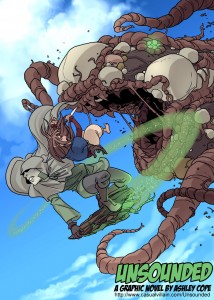Scarper, Montgomery
Joy and annoyance come to every party together.
Whatever is worth talking about is inherently joyous, but because we have to talk about it, it will always be annoying. Because you and I read fantasy, we are in a very joyous position that the question of how seriously fantasy should take itself will always be something worth talking about. And because you and I have opinions on the subject, we’re bound to annoy each other eventually.
And under the auspices of this revelation did I realize that very few things annoy me more than the word “escapism.”
Specifically, the phrase “it’s escapist.”
Always offered briefly, intended as explanation but offered as excuse.
At some point when we’re talking about fantasy, we will reach a chasm. It will be a very short gap to jump, bridged by the words “you know, I don’t think we like the same things,” but it will always seem huge to us because to confess that certain things don’t work for us, we confess that there is no one great almighty answer to the question “what is good fantasy.”
So instead, we use the phrase “it’s escapist” and we stay firmly on our side of the chasm. The conversation grinds to a halt, anything else we might have said about the subject will never be said and we have to wait until the next time we talk about this to be annoyed all over again.
That’s a big reason I hate the word. But it’s not the only one.
We don’t use the word “escapist” correctly.
In general, when someone offers up the phrase “it’s escapist,” it’s code for “I know it’s perceived as shit, but I like it.” Thus, our minds make the connection that “escapist” = “shit” and escapist fantasy is shit fantasy in which half-naked dudes save half-naked babes from wholly-naked dragons. Or something.
The thing is, no one escapes into a bad book. They devour a bad book, maybe. But to escape, to inhabit another life in another world with another conflict, you need to be invested in it. You can’t escape into a character you don’t feel anything for. And if there’s investment in the character, the world, the conflict, then the author, on some level, has done their job. They have made you care. More than that, they made you care enough to feel like you’re there, in this skin on those feet in this pair of boots on that ground.
We escape into good books. We merely visit bad ones.
We think that escapism makes us turn our brains off.
There is, for some reason, a private shame that comes from enjoying oneself. If you love a sweet, it must be because it’s bad for you. And if you love a book that’s mostly sweet, it must be bad for you, as well. So we say that we read the shallow stuff to turn our brains off, to take a vacation from our own thoughts.
Brains don’t work like that.
Just by reading something, you are, in fact, engaged. And if you happen to enjoy it, even if you know (or think you know) it’s bad for you, then your brain is actually probably very engaged. But because the story has an element that might be considered simplistic, straightforward or juvenile, we don’t bother explaining why we’re engaged.
We never say that we happen to enjoy the straightforward, unquestioning morality of the hero and, thus, we never have a discussion about whether that’s a good thing or a bad thing. We look at what other people say about that morality and somewhere along the line, someone says it’s juvenile, or shitty fantasy and we, having liked that, say: “Well, I just wanted to turn my brain off for a bit.”
You didn’t. You just didn’t want to explain why your brain wasn’t turned off the same as anyone else.
We use the word to explain away the success of what we perceive as bad writers.
We love to bash Twilight. It’s a hobby. We love to point to its simplistic characters and laugh, we love to point to its juvenile plot and giggle, we love to point to its bland-as-dishwater writing and slap our own genitalia in raucous joy.
Until it comes time to point to its success.
And then we say “well, it’s escapism. People enjoy escaping their own lives.” Because, for some reason, this is a more palatable explanation than suggesting that there might actually be something to this book in which love is a dominant theme, in which holding hands is sexy, in which we admit that maybe there is a part of us that wants that for ourselves. And it’s certainly less work to call it “escapist” than to perhaps wonder why it is these readers don’t get love from books we like, why it is that readers seek out comfort in human contact rather than political intrigue, why it is that we can or can’t do it better.
And suddenly, we have a very good conversation wasted.
We use the word to excuse the difficulties of books we perceive to be good.
We love to praise Name of the Wind. We love to point to its complex plot and swoon, we love to point to its lyrical prose and sigh wistfully, we love to point to its thoughtful, vivid characters and say “yes, that’s exactly how it should be.”
Until it comes time to point to the fact that there are debatably very few female character in that book that didn’t exist to placate/satisfy Kvothe.
Then we say “it’s escapist. No harm in a little wish-fulfillment.” Because, for some reason, this is a more palatable explanation than suggesting that, for as far as we’ve come, we’ve still got a ways to go, that maybe we actually do crave that but haven’t figured out how to do it better, that maybe once in awhile the relentlessly bleak, politics-heavy, evil-son-of-a-bitch-of-a-protagonist grimdarkness that has become the norm in fantasy might not be authentically true to life as we thought it was. And it’s certainly less work to say “escapist” than it is to discuss why it is that our authors can sometimes fall into the same mistakes as their forebears, than it is to discuss why we exchanged one set of tropes for another, than it is to say that sometimes, yes, we fucked the pooch a little here.
And again, another good conversation is wasted.
Summation.
Look, I write a series in which a brooding young man, along with a girl with a bow and tight pants, a fearsome dragonman and a boy wizard that urinates fire duke it out in tremendously over-the-top battles full of bloodshed, banter and emotions running so hot it sometimes even makes me stop and wonder if I’m going too damn far.
I’m not a stranger to the concept of escapism.
But I call it “fun.” I like stories like that. That’s why I write them. And that’s why I discuss them. And that’s why sometimes I persuade readers to give the story about the boy-with-a-voice-in-his-head falling in love with the hissing-girl-with-identity-issues while they both stomp on a pile of demon corpses a try. That’s also why sometimes I’m forced to eat a little shit when someone says that a 125-page fight scene is really exhausting and why sometimes it feels like every groan-worthy fantasy trope is being paraded around with gleeful abandon.
Somewhere along the line, though, we stopped giving “fun” a serious meaning. We stopped enjoying stuff that makes us smile because, surely, it must be juvenile. We stopped admitting that sometimes holding someone’s hand is amazingly intense because, surely, that’s not as important as who’s going to assassinate who. And we stopped admitting that sometimes we don’t have all the answers because, surely, we don’t read “escapist” books.
Call it “fun,” call it “escapism,” but don’t make the mistake that it’s bereft of meaning just because of that. And don’t make the mistake that just because it is fun that it doesn’t have to have something else going on.
Everything that is joyful must also be a little bit annoying.
Today’s featured image comes from Gunnerkrigg Court by Tom Sidell, which you really should be reading.
Scarper, Montgomery Read More »

